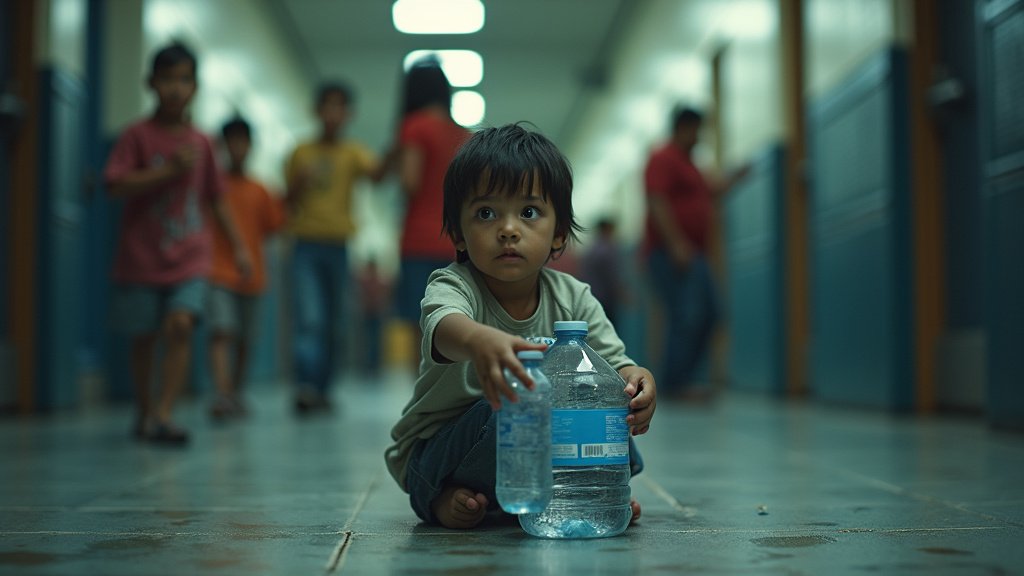Children Scramble for Water, Face Medical Neglect Amidst Texas Family Detention Center Crisis
DILLEY, Texas – Disturbing reports from within the ICE South Texas Family Residential Center in Dilley, Texas, paint a grim picture of conditions for detained immigrant families, with allegations of children resorting to fighting adults for scarce clean water and enduring significant delays in accessing critical medical care. These revelations have emerged from testimonies collected by immigrant advocacy groups and are central to ongoing legal battles aimed at preserving protections for children in federal custody.
Allegations of Scarcity and Desperation
Recent accounts from families held at detention facilities, including the South Texas Family Residential Center in Dilley and the Karnes County Immigration Processing Center, detail a desperate struggle for basic necessities. Advocates report that water is often rationed, leading to intense competition. One 16-year-old girl described a chaotic scene where “everyone has to run for it” when a small case of water is distributed, recounting an instance where “an adult here even pushed my little sister out of the way to get to the water first”.
Concerns extend beyond mere quantity to quality. Families have described the tap water as cloudy and emitting a strange smell, leading some mothers to use bottled water for infant formula, which in turn has resulted in children suffering from prolonged diarrhea. In one instance, a mother was reportedly told to use tap water for her 9-month-old’s formula, leading to the infant experiencing diarrhea for three days. Such conditions raise serious questions about the sanitary standards being maintained within these facilities.
Medical Neglect and Health Crises
The testimonies also highlight a pattern of inadequate and delayed medical attention for children. One child reportedly experienced a severe stomachache and had to wait six hours to see a nurse. Other alarming accounts include a child with appendicitis who was allegedly told to wait three days for treatment.
More severe health concerns have also surfaced. A family with a young boy diagnosed with cancer reported that he missed a crucial doctor’s appointment after being detained and is now exhibiting relapse symptoms. Another child with a blood condition experienced feet so inflamed that he became unable to walk, and despite seeing a doctor, was allegedly denied further diagnostic testing. A 9-month-old infant reportedly lost over eight pounds during a month-long detention. Pediatricians have expressed concern, with some healthcare professionals in San Antonio referring to children released from Dilley as “Dilley-ish” due to common respiratory and gastrointestinal issues observed after their release.
Facilities Under Scrutiny
The ICE South Texas Family Residential Center in Dilley, the largest family detention center in the country with a capacity for approximately 2,400 people, has been a focal point of these allegations. This facility, along with the Karnes County Immigration Processing Center, is operated by private prison companies – CoreCivic manages the Dilley center, and Geo Group runs the Karnes facility.
These centers have a complex history. The Dilley facility was reopened in March of the current year under the Trump administration after being closed by the Biden administration due to high operational costs. Advocates point out that even when facilities are closed, contracts might be extended, and the push for increased detention capacity continues. Reports of foul water and negligent medical treatment have been associated with the Dilley facility even prior to its recent reopening.
The Legal Battle for Protections
These deeply concerning accounts have been compiled by immigrant advocates and submitted as part of legal filings aimed at preventing the Trump administration from terminating the Flores Settlement Agreement. This 1990s-era policy mandates that immigrant children in federal custody must be held in safe and sanitary conditions and sets limits on how long they can be detained.
The administration’s efforts to end or significantly alter the Flores Agreement are part of a broader strategy to reshape immigration policy, potentially allowing for indefinite detention of families. U.S. District Judge Dolly Gee in Los Angeles is presiding over the case, having requested more information from ICE regarding detention times for children. While ICE reported a decrease in average detention lengths for children over 72 hours, attorneys representing the children argue that some are still held for weeks or months without clear justification.
Advocates Sound the Alarm
Organizations such as RAICES, the Center for Human Rights and Constitutional Law, and Children’s Rights have been instrumental in gathering and presenting these testimonies. They argue that the conditions in these facilities are not only inadequate but often inhumane, leading to significant psychological and physical trauma for children and their families.
Leecia Welch, deputy legal director at Children’s Rights, stated that conditions are likely to worsen as more immigrants are brought into facilities that are operating below their full capacity. “With a capacity of around 2,400, it’s hard to imagine what it would be like with 2,000 more people,” she noted. Advocates are calling for transparency and accountability, emphasizing that access to these facilities by monitors is crucial for ensuring compliance with standards.
Broader Context and Future Concerns
These reports emerge amidst a broader trend of increased immigration enforcement operations under the current administration, which has shifted focus from border arrests to internal operations within the U.S.. The ongoing legislative discussions around immigration, including proposals for massive funding increases for detention, signal a potential expansion of these practices.
Concerns are also mounting over the long-term implications of prolonged detention for children’s development and mental health. Reports detail children experiencing significant psychological trauma, including behavioral changes like self-harm and refusal to eat.
As legal challenges continue and advocacy groups press for greater oversight, the focus remains on ensuring that the well-being and human rights of immigrant children and families detained in Texas are adequately protected. The current situation highlights the urgent need for robust enforcement of existing protections and a re-evaluation of detention policies.






